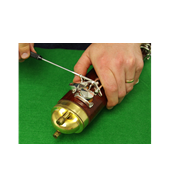Six Steps to Practicing the Bassoon and Achieving Results Fast
June 21st, 2018

Six Steps to Practicing the Bassoon and Achieving Results Fast
Article Author: Oliver Ludlow, In-House-Bassoon Specialist and Director at Double Reed Ltd.
Practicing your bassoon shouldn’t be like training for a marathon. Treating learning a musical instrument like an endurance sport is counter-productive – lengthy, inattentive practice only serves to reinforce mistakes, and slows our ability to make real progress. Short bursts of highly focused practice (30-60 minutes a day) is the most effective, efficient and rewarding way to improve your musical ability.
In this guide we outline a method of practice called ‘deliberate practice’, drawing on research conducted by Professor of Psychology K. Anders Ericsson, co-author of ‘Peak: Secrets from the New Science of Expertise’, who is arguably the foremost expert on the psychological nature of expertise and human performance in the world.
1. Specific goals for every session
In order to improve your bassoon playing, you need to set out specific goals for what you want to achieve in each practice session – these goals cannot be broad, vague or unmeasurable.
A good tip for identifying your goals is to play your practice piece, exercise or study through, note down the bars that you struggle with, and crucially, why you struggle with them – these bars become your goals for future sessions.
For example, one of your goals might be to measure your current tonguing speed with a metronome and set a target speed for yourself to aim for - this goal is specific and measurable.
Always have a pencil to hand, and mark down notes on your sheet music as you go. Your sheet music is your visual map of how each piece of music, study or exercise should be played, including your decisions about phrasing, where to breathe, dynamics, and so on.
2. Focused practice
Don’t get distracted - focus intently on what you are doing, how you are doing it and whether you are coming close to reaching your session goals.Habits such as aimlessly repeating the same section over and over, or playing a piece on autopilot, can impede our progress.
You should start out playing each bar (or half bar if necessary) slowly, and running through the movements in your mind – if you start out attempting to play the tricky bars at full speed you risk making errors whichbecome further entrenched each time you try.
Your practice session should last only for as long as you are able to concentrate in full – if you can’t concentrate for longer than an hour, any practice done beyond this will be less effective. It’s important to remember that even 10 minutes of practice is better than nothing.
If your concentration begins to slip, take a 5-minute break, drink a glass of water or go for a short walk – don’t persevere when you’re not able to concentrate, as this is counter-productive.
3. Immediate feedback
It is vital that you are able to analyse your performance immediately after each attempt – waiting until the end of the session will delay progress.
Take note of how your practice is going, and closely analyse your progress carefully:
- How are you executing each bar?
- How close are you to mastering these bars?
- What dissatisfies you about your last attempt?
- How could you change your approach to help you achieve your goal?
Another great way to analyse your performance is to film yourself playing and watch it back – are you happy with your sound? Is your posture correct? Are you keeping an even speed?
Carefully scrutinise each attempt and think about how you can improve. Write down any questions that you can’t answer yourself and take them to your next bassoon lesson to ask your teacher.
It is important to tackle one session goal at a time, and once you’ve mastered that bar, test yourself using the ‘three times rule’ – if you can play the piece correctly three times in a row consecutively, then you can tick that goal off your list, and move onto the next one.
4. Leave your comfort zone
The best way to improve is to practice outside your comfort zone, persistently pushing up against the boundaries of your ability.
If you make a mistake, don’t start the whole piece over again – this wastes time on areas inside of your comfort zone that you’ve already mastered. Instead, focus in on the bars that you can’t do and master them before moving on to your next goal. Tackling the difficult bars can be frustrating in the short term, but it is highly rewarding when you break through that boundary and move on to your next goal.
5. Find an expert bassoon teacher
Getting lessons from an expert bassoon teacher is essential, as the teacher will be able to put you on a structured learning plan and take you through each stage, setting you goals and giving you constructive feedback atevery step. Bassoon teachers will have learnt the hard way and will have years of experience in what not to do when practicing - they can pass useful ‘tricks of the trade’ on to their students and save you a lot of time.
All four of the previous steps will be enhanced by your bassoon teacher, as they will be able to test whether you’ve achieved your goals, and assert the right amount of pressure to keep you moving forward continually.
*Need a bassoon teacher? Get in touch and we’ll be happy to recommend a good bassoon teacher in your area.
6. Don’t just play on your own
One of the most enjoyable and fruitful ways of playing the bassoon is in a group – take advantage of local orchestras and ensembles in order to enhance your playing, and get a feel for how the bassoon fits into a wider soundscape. These experiences will be invaluable to nurturing your ability and helping to keep you motivated.
You may also find new techniques by watching clips of professional bassoonists online, or by going to see live performances and watching how it’s done on stage.
In summary: spend time wisely - play deliberately
Playing ‘deliberately’ is very beneficial but hard work, so make sure you make time to play fun pieces and enjoy experimenting outside of your set plan. Not only will this keep you motivated, but you’ll also learn important lessons as you go.
Professor K. Anders Ericsson’s research shows that there are basic principles, like the ones set out here, that can help anyone become a highly competent musician – all you have to do is spend your time wisely and deliberately.
Article Author: Oliver Ludlow, In-House-Bassoon Specialist and Director at Double Reed Ltd.




